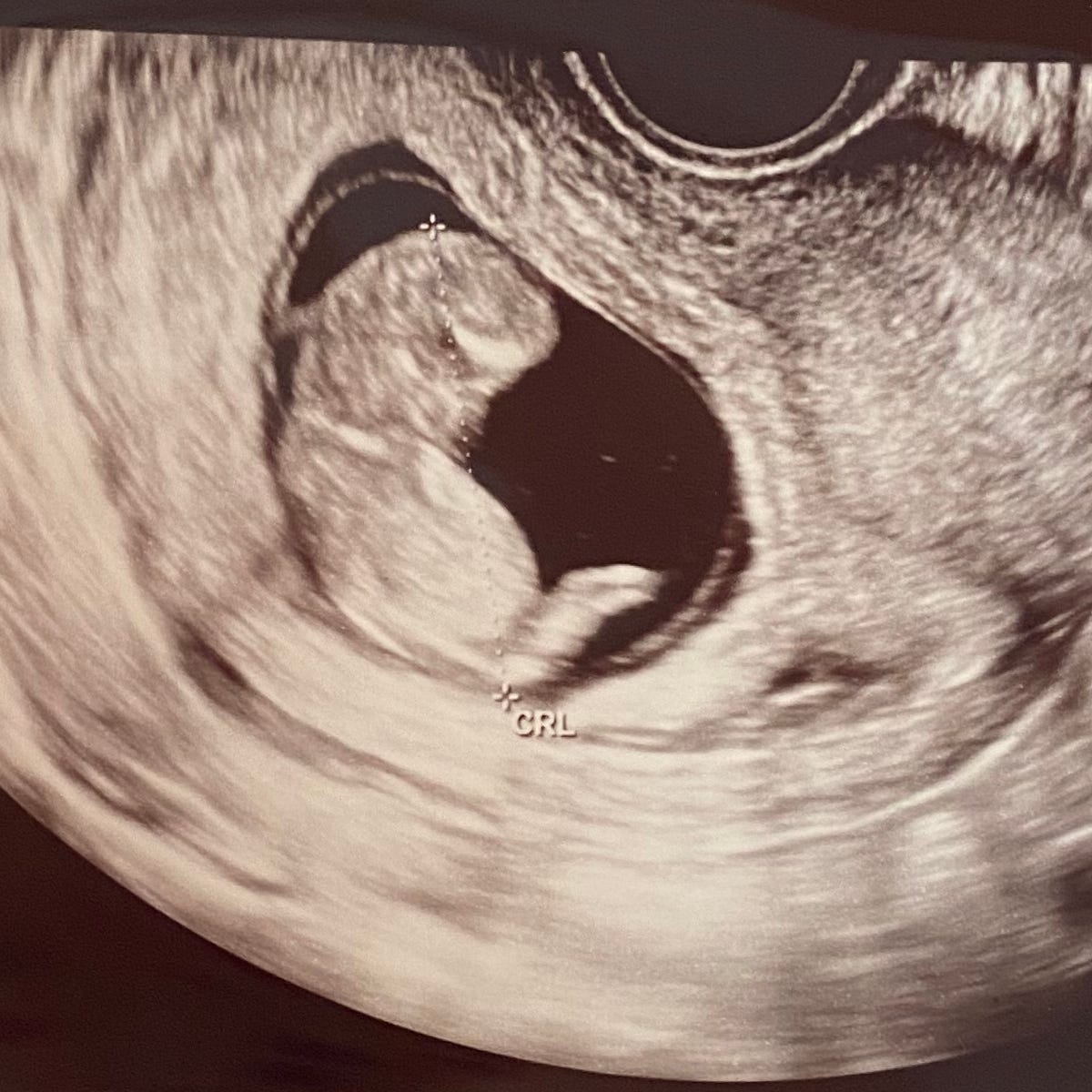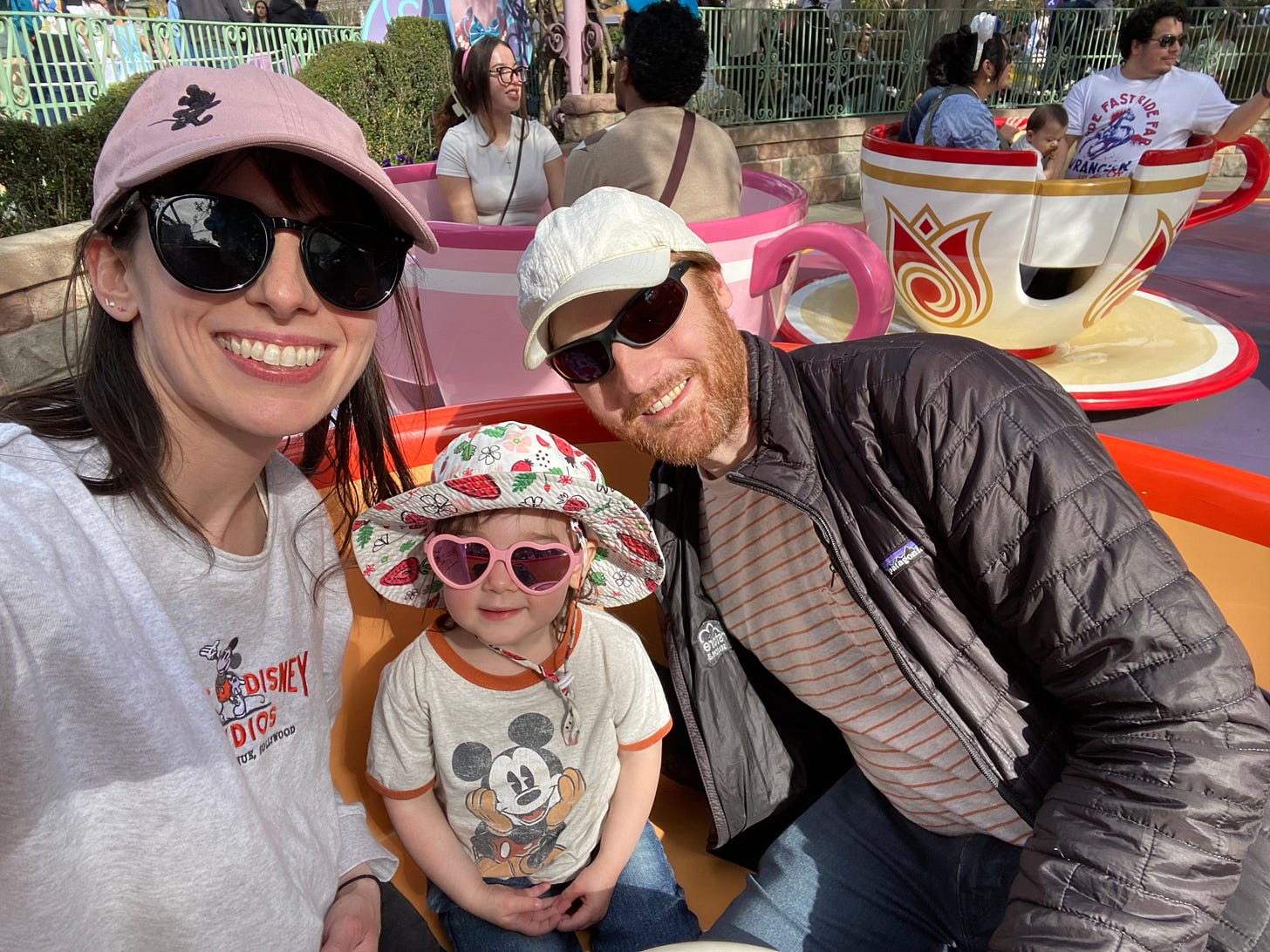A Disability Time Paradox
If you could change anything about your past, what would it be?
As a writer, I can’t help wondering what I would do with a second draft of my life. We all have those embarrassing moments we wish we could revise. Or those parts of our past we wish we could cut altogether.
That’s what I was thinking about while Robin and I sat on the couch, waiting for my eye doctor to join the Zoom. Most people don’t consult their eye doctor before deciding whether to have a baby, but here we were.
We had always talked about having a kid, so a few years earlier, when Robin’s OB mentioned there was a sale on pre-pregnancy genetic panels, we jumped at the chance. Just $99 to test over 300 recessive genetic conditions? What a steal! Her OB was thrilled with the results. “You’re only a carrier for one thing: Stargardt’s Disease. It’s a form of macular degeneration that results in central vision loss. But don’t worry, it’s pretty rare.”
We knew all about Stargardt’s Disease because I have it. And, if I remember anything about Punnett Squares from high school biology, that meant any child we conceived would have a 50/50 chance of getting it too.
I had spent 30 years coming to grips with my disability, figuring out how to see myself as anything other than damaged goods. In that moment all the work I’d done shattered. All the most painful memories, the ones I thought I’d buried long ago, rose from the trauma graveyard and came for me.
The cold hospital basement where even colder doctors taped my eyelids open and connected electrodes to my pupils like a mad scientist’s torture machine.
The snickers of my classmates as I tried and tried and failed to read the blackboard with my monocular (a tiny telescope that my parents spent their hard-earned savings on) before I threw it away in humiliation.
The dirty-rubber-and-blood aftertaste of the basketball that hit me in the face when all my friends were playing and I insisted I could still keep up.
That’s not even counting the quiet dismissals, the bruised shins, or the job interviews that fizzled the moment they realized. All the moments I wished I could scratch out in red ink. It was a vicious reminder that deep down, beneath all the therapy and positive self-talk, I hated my eyes. And I hated myself for having them. Would I really risk condemning my future child to the same fate?
That anxiety spiral eventually led us to the zoom with my retina specialist. We were hoping he could shed some light on potential treatments or cures. Maybe the next generation wouldn’t have it so bad... His answer was basically, “They’re working on some pretty cool stuff, but we can’t say for sure when it will be available.” I deflated. That was the same thing they told me when I was seven. I’ll never forget the doctor patting me on the back and telling me that my eyes would definitely be fixed by the time I could get my driver’s license. At this rate, humans will be done driving before I get the chance.
Sensing our distress, the retina guy asked if we wanted to know what other couples had done in our situation. Um, yes, we very much did. There were two main paths if we wanted a biological child. The first was IVF. Science has gotten to the point where we can grow an embryo until it’s eight cells big and then pluck off one of them to test the DNA. It seems crazy that we can just rip off 12.5% of something’s entire body mass and it grows up just fine, but that’s the case. The only problem is that it’s astronomically expensive. Our insurance considered it elective—even though the same insurance company viewed my eyes as such a dangerous health risk in 2008 that they refused to cover me at all. Even with insurance, we wouldn’t have been able to swing it. I was between TV writing jobs and Robin was a contractor with limited benefits.
“What’s option two?” we asked. He delicately informed us that we could conceive naturally and then have it tested in-utero as early as possible. If it came back positive for Stargardt’s, we could choose to have it terminated. Basically, we could edit out that genetic typo. Hit backspace and try again.
It’s strange how things can be both perfectly rational and utterly horrifying. Or maybe it’s not strange at all. Maybe there’s always a little horror when perfect rationality touches real life. Suddenly, having a baby felt like ordering from Amazon with free returns. There are lots of good, necessary reasons on the dropdown for “Why are you returning this item?” but was Stargardt’s Disease one of them?
That perspective shift brought everything into focus. The question wasn’t would I risk condemning someone to my life, but would I deny them the chance to live theirs. I couldn’t help but ask myself, if my parents had that choice, would they have terminated me? Did I wish they had? The answer was an immediate and visceral “no”! (At least for me; I can’t speak for my parents, but I hope it’s been worth it.)
That “no” was the beginning of something. For a long time, I had thought of my eyes the way you’d think of a bruised apple. “That’s not how it’s supposed to be. It’s still okay if you cut around the bad spots.” My scarred retina was this external thing, a burden to be borne. But the very act of reducing my life to a simple “yes or no” forced me to reckon with it in a way I hadn’t before. Those painful memories had to stack up against the rest, some eye related, some not at all.
The snow frozen to my hair on a family cross-country ski trip.
The rush of performing in my first band or in my first play. Of writing my first poem, my first joke, my first story.
The feather on the headband of the cute girl at the party who would eventually become my wife.
Plus swimming and Christmases and pizza and a thousand days where I was so lucky to be alive. So lucky.
But the reckoning didn’t stop with the pro-con list. Everything started tangling in my mind like a drawer full of charging cables. If I was still playing basketball, I wouldn’t have been hanging out with the friends who introduced me to Star Wars, Dungeons & Dragons, and The Hitchhiker’s Guide to the Galaxy. And despite what High School Musical would have you believe, I wouldn’t have had time for theater or making movies. Theater became my college major, which may not have been the most practical life decision, but I met some of my best friends and favorite people there—including the friends who introduced me to Robin. When my comedy troupe started touring, I couldn’t help drive the van, so I taught myself the business side of things, skills I still use today when producing.
It’s not that the good outweighed the bad; it’s that the good was the bad, and all of it was just stuffed inside me haphazardly like a trash bag of old clothes for Goodwill. I’m here in spite of my eyes and because of my eyes—all at once. If I made it this far on this sloppy mix of genes, they couldn’t be that bad. Plus our baby would get 50% of Robin’s, which I personally think are pretty amazing. So we took the third path, one the retina guy hadn’t mentioned. We made a baby.
An hour after our daughter was born, a nurse pricked her heel to test her blood. The next morning, while we were still in the sleep-deprived bliss-haze of new parenthood, a pediatrician solemnly informed us that our daughter had inherited two mutated ABCA4 alleles. She had the genes for Stargardt’s.
Our daughter’s vision is good so far, but she’s at risk of developing symptoms as she gets older. We take steps to mitigate the potential damage (wearing sunglasses and a hat is her signature look), and we’re optimistic about many of the clinical trials that could protect her eyes from ever becoming like mine. But mostly, we’re optimistic about this little human we brought into the world. She’s two now, and already the most brilliant, intrepid, empathetic person I know. If I had changed anything, if I went back and revised even the smallest detail, I might never have met her. If that means I have to stand by the rough draft, with all the visible mistakes and misfortunes, then so be it.
I think this is one of the ways time heals. It doesn’t fix our wounds, our regrets, or our failures. It just keeps growing out of them things of such staggering beauty, infinite in their uniqueness, that somehow a few basketballs to the face don’t seem so bad.





Bravo, Marc. Lovely read
💜💜💜